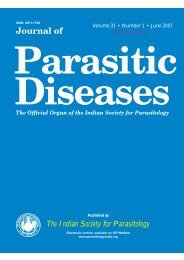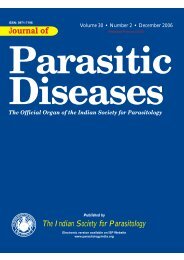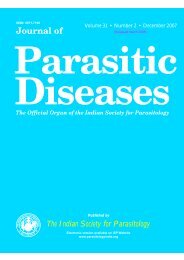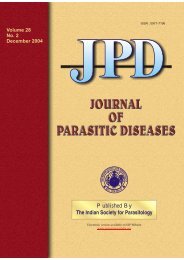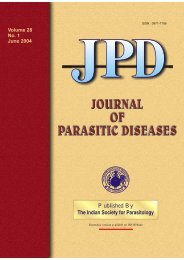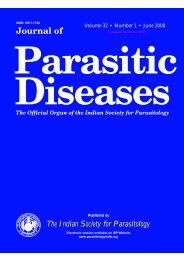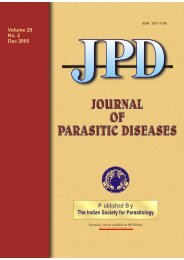Vol 27 No 2 December - The Indian Society for Parasitology
Vol 27 No 2 December - The Indian Society for Parasitology
Vol 27 No 2 December - The Indian Society for Parasitology
Create successful ePaper yourself
Turn your PDF publications into a flip-book with our unique Google optimized e-Paper software.
Journal of Parasitic Diseases<br />
<strong>Vol</strong>. <strong>27</strong> (2) Dec. 2003, pp. 76-84<br />
Parasitic infections in travelers visiting<br />
tropical countries<br />
Review<br />
+<br />
SUBHASH CHANDRA PARIJA*, SURESH CHANDRA PRADHAN , SANJAY BHATTACHARYA<br />
+<br />
Departments of Microbiology & Pharmacology , Jawaharlal Institute of Postgraduate Medical Education<br />
and Research, Pondicherry-605 006, India<br />
International travel <strong>for</strong> tourism, military operations, exploration and adventure is on the increase. About<br />
20% of the world population harbors parasites and the resulting morbidity and mortality from such diseases<br />
are most prevalent in tropical and subtropical countries, which are visited every year by millions from the<br />
developed nations. A non-immune traveler from a non-endemic region is thus exposed to a multitude of<br />
infections including parasitic diseases, from enhanced contact in a changed ecological milieu. <strong>The</strong> travel<br />
related major parasitic infections in the <strong>Indian</strong> subcontinent could be classified as food and water borne<br />
(amoebiasis, giardiasis, intestinal coccidiosis), vector borne (malaria, filariasis, visceral leishmaniasis), and<br />
soil transmitted (geohelminthic infections like ascariasis, hookworm infestation, trichuriasis,<br />
strongyloidiasis). Lack of hygiene and sanitation in large parts of the tropical world, increased vector<br />
density and man-vector interaction in exotic environmental niches, and lack of adequate personal protective<br />
measures from ignorance or complacency have contributed to increased cases of parasitic infection among<br />
travelers, visiting the tropical countries. <strong>The</strong> resistance of parasites and vectors to chemotherapy and<br />
insecticides respectively has compounded the problem. As effective vaccines have not yet been developed in<br />
parasitic diseases, personal protective measures in the <strong>for</strong>m of health education, pre-travel counseling, and<br />
chemotherapy remains the only effective approach to prevent and treat parasitic infections among travelers.<br />
Prophylaxis, diagnosis, and therapy of these infections represent an opportunity and challenge to the health<br />
care professionals in developed nations.<br />
Key Words : Parasitic diseases, tropical countries, travel medicine, chemotherapy<br />
to jet planes and underwater tunnels has<br />
revolutionized the way we move between countries<br />
and continents. However, the globalization of man has<br />
had its own side effects. One of them is the plethora of<br />
infections to which a non-immune traveler from a non-<br />
endemic zone is exposed while visiting an endemic<br />
one. Tourists, seamen, business entrepreneurs,<br />
military personnel, the adventurer, and the explorer<br />
from developed nations visiting the tropics are<br />
subjected to a wide variety of infectious agents during<br />
the course of their travel. <strong>The</strong> disease that they acquire<br />
is either manifested during their travel, or remains<br />
asymptomatic initially, and get overt later on after the<br />
incubation period is over. In both instances however,<br />
the visiting traveler or the returning travelers' health is<br />
at stake.<br />
Parasitic infections are one of the commonest causes<br />
INTRODUCTION<br />
"For with long travel I am stiff and weary."<br />
-William Shakespeare<br />
eople travel to many different places, <strong>for</strong> many<br />
Pdifferent reasons, with many different interests, in<br />
many different ways. Man's movement from place to<br />
place either as a struggle <strong>for</strong> existence or as a source of<br />
psychological sustenance has paralleled his evolution<br />
from a primitive creature to a modern human. Today<br />
man travels <strong>for</strong> many reasons. A search <strong>for</strong> the<br />
unknown, a destination <strong>for</strong> leisure, a tour <strong>for</strong> business,<br />
and a voyage <strong>for</strong> a war, are some reasons, which make<br />
man move from one place to another. <strong>The</strong> evolution of<br />
the transport systems from sailing ships and caravans<br />
* Corresponding Author



